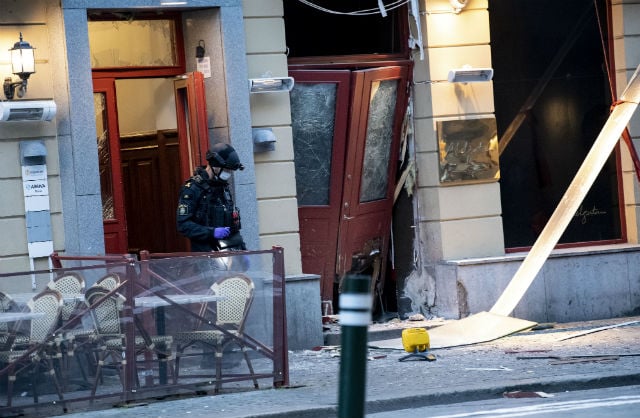CRIME
Number of bomb attacks in Sweden has surged this year
The number of attacks with explosives has increased significantly so far this year, according to the latest official figures, with 93 attacks up until the end of May.
Published: 16 June 2019 11:35 CEST

An attack on a nightclub in central Malmö earlier this year. Photo: Johan Nilsson/TT
By the same time last year, the tally was at just 63.
According to the Swedish National Council for Crime Prevention, which collects the figures, there were 162 explosions reported last year. Figures are not available for earlier years as, the council only began counting explosions as a separate category in 2018.
“There's an arms race going on in the world of organised crime,” Stockholm University criminologist Sven Granath told Swedish state broadcaster Sveriges Radio.
This week in Malmö, there were three attacks over a single 24-hour period, while last week a massive blast blew out all the windows of an apartment building in Linköping.
The attacks have led some to talk of a new wave of violence hitting the country.
“If we accept this this is the real rate of growth, it's a lot and of course very serious,” Manne Gerell, Associate Professor in Criminology at Malmö university, told the broadcaster.
“Many people suspect that more or less the same people are involved in the explosions as in the shootings. So we might think that certain groups have started using explosives more than they did previously.”
Granath said that Sweden's new weapons had also led to increased seizures of pistols, pushing some criminals to use explosives instead. Gerell said that it looked as if criminals had learnt how to use explosives, and were therefore more willing to use them.
“They know that they have explosives as an alternative, which they perhaps wouldn't have considered five years' back,” he said.
He said that in most cases the explosives seemed to be used to scare people and make a statement, with only a few cases looking designed to kill or injure.
“Because most of the explosions are at places where there are no people on the scene — entrances, empty shops or vehicles — it's a reasonable hypothesis at this is most often about sending a message or signal,” he said.
Granath warned that attacks with explosives were more likely to end up injuring innocent bystanders than shooting attacks.
“Some people have been shot dead by mistake, but there are also people who have been killed by explosives by mistake and I think the risk of being 'caught up in the cross-fire' is greater with explosives,” he said.
He said that explosives attacks which can be heard several kilometres away also had a more damaging impact on local communities, giving people the sense they were living in danger.
“It's obvious that it affects an extremely large number of people. It sends the signal that something is dangerous and unpleasant.”
Url copied to clipboard!


 Please whitelist us to continue reading.
Please whitelist us to continue reading.
Member comments